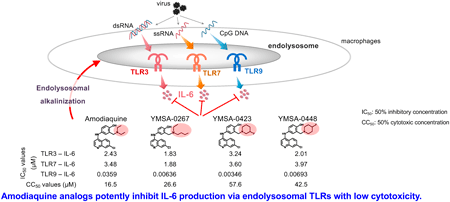- J-STAGE home
- /
- Biological and Pharmaceutical ...
- /
- Volume 47 (2024) Issue 12
- /
- Article overview
-
Yohei Takenaka
Department of Radiation Biosciences, Graduate School of Pharmaceutical Sciences, Tokyo University of Science
-
Tomohiro Tanaka
Department of Bioorganic and Bioinorganic Chemistry, Graduate School of Pharmaceutical Sciences, Tokyo University of Science Graduate School of Medicine, Dentistry and Pharmaceutical Sciences, Okayama University
-
Shotaro Otaki
Department of Bioorganic and Bioinorganic Chemistry, Graduate School of Pharmaceutical Sciences, Tokyo University of Science
-
Azusa Kanbe
Department of Bioorganic and Bioinorganic Chemistry, Graduate School of Pharmaceutical Sciences, Tokyo University of Science
-
Tomoe Morita
Department of Bioorganic and Bioinorganic Chemistry, Graduate School of Pharmaceutical Sciences, Tokyo University of Science
-
Kenta Yokoi
Department of Bioorganic and Bioinorganic Chemistry, Graduate School of Pharmaceutical Sciences, Tokyo University of Science
-
Saki Sekiguchi
Department of Bioorganic and Bioinorganic Chemistry, Graduate School of Pharmaceutical Sciences, Tokyo University of Science
-
Koki Nakamura
Department of Bioorganic and Bioinorganic Chemistry, Graduate School of Pharmaceutical Sciences, Tokyo University of Science
-
Hidetoshi Satoh
Department of Bioorganic and Bioinorganic Chemistry, Graduate School of Pharmaceutical Sciences, Tokyo University of Science
-
Toshifumi Tojo
Department of Bioorganic and Bioinorganic Chemistry, Graduate School of Pharmaceutical Sciences, Tokyo University of Science Research Institute for Science and Technology (RIST), Tokyo University of Science
-
Fumiaki Uchiumi
Department of Gene Regulation Graduate School of Pharmaceutical Sciences, Tokyo University of Science
-
Kazuki Kitabatake
Department of Radiation Biosciences, Graduate School of Pharmaceutical Sciences, Tokyo University of Science
-
Shin Aoki
Department of Bioorganic and Bioinorganic Chemistry, Graduate School of Pharmaceutical Sciences, Tokyo University of Science Research Institute for Science and Technology (RIST), Tokyo University of Science Research Institute for Biomedical Sciences (RIBS), Tokyo University of Science
-
Mitsutoshi Tsukimoto
Corresponding author
Department of Radiation Biosciences, Graduate School of Pharmaceutical Sciences, Tokyo University of Science Research Institute for Science and Technology (RIST), Tokyo University of Science
2024 Volume 47 Issue 12 Pages 2101-2118
- Published: December 21, 2024 Received: September 25, 2024 Released on J-STAGE: December 21, 2024 Accepted: October 28, 2024 Advance online publication: - Revised: -
(compatible with EndNote, Reference Manager, ProCite, RefWorks)
(compatible with BibDesk, LaTeX)


